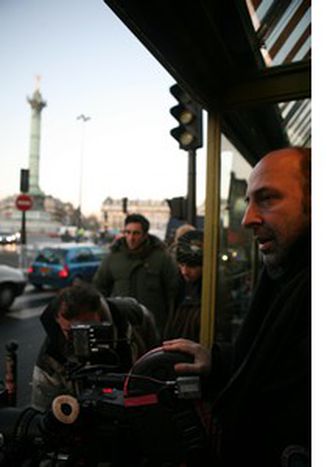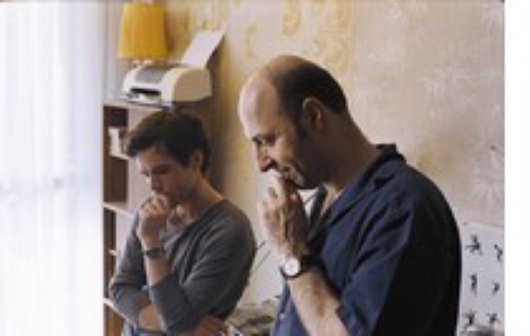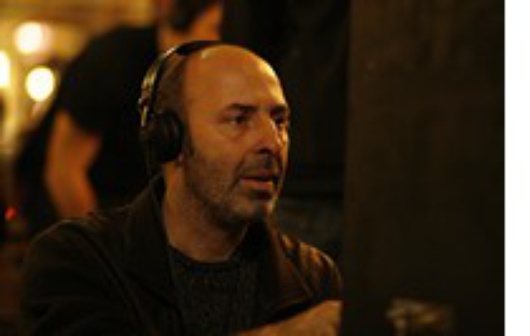
Klapisch: 'Erasmus students imagine a new Europe'
Published on
Translation by:
 kate stansfield
kate stansfield
Affectionate observer of the Erasmus generation that he captured on film in L'Auberge Espagnole, French director Cédric Klapisch depicts a chaotic and extremely vibrant Europe.
At 46, you are nearly the same age as the European Union. Do you think European cinema and the Union have grown at the same rate?
No, I believe that political Europe and European cinema have little in common. There are several 'Europes', just like there are several 'Frances', several 'Parises', several 'mes'. There is the Europe of Brussels, the Europe of farmers, the Europe of students, the Europe of footballers, the Europe of rockers, the Europe of filmmakers... these are different Europes at different phases.
The message that I tried to get across with L'auberge Espagnole ('Pot Luck', 2002) is that political Europe is constructed 'alongside' that being built by the leaders of each member state. Erasmus students have their own way of imagining a new Europe, which is not quite that which Brussels wishes to create.
The concrete result is that those twenty-somethings live Europe in an intimate and everyday way. It isn't Brussels that has invented the European identity. It existed long before that, in the regular exchanges of the literary, scientific and philosophical communities. In the 30s and 40s, Hollywood cinema took much inspiration from European directors - Josef Von Sternberg, Fritz Lang, Alfred Hitchcock.
Your last films, L'auberge espagnole and The Russian Dolls (2005), reflect the process of young European integration and a certain, deeply multicultural, reality. Do you believe that a 'European cinema' exists, beyond the financial issue of coproductions?
 European identity exists when you're in America or when in Asia or Africa by comparison. It is by studying in New York that I understood the extent to which I shared things I hadn't suspected with Russians, Italians or Germans. It is through living in America that I saw the extent to which Marcel Proust, Molière, Shakespeare, Goethe, Dostoïevsky, Italo Calvino, Primo Levi or Cervantes form part of a universe that I share, and that Americans are less familiar with.
European identity exists when you're in America or when in Asia or Africa by comparison. It is by studying in New York that I understood the extent to which I shared things I hadn't suspected with Russians, Italians or Germans. It is through living in America that I saw the extent to which Marcel Proust, Molière, Shakespeare, Goethe, Dostoïevsky, Italo Calvino, Primo Levi or Cervantes form part of a universe that I share, and that Americans are less familiar with.
That is true of sport, cinema, politics or thought in general. In other words, perhaps European cinema doesn't exist in Europe but it seems to be identifiable in the United States where they'll tell you that Ken Loach, Nanni Moretti, Pedro Almodovar, Patrice Chéreau or Emir Kusturiça are 'European' auteurs, with a sort of common language that is not necessarily perceptible when viewed from where we are.
What about your films: are they European, French? Are they the fruit of different influences?
In L'Auberge espagnole, one of my characters, a young black man, says: 'I have several identities: I am European, Catalan, Spanish, but I am also black, an African of Gambian origin.' Like him, I believe that we have different identities, that they are diverse and not necessarily contradictory or schizophrenic. I myself feel French but also European. I studied in New York and therefore feel strongly influenced by their culture. The fact that we live in a multicultural world, with all its diverse influences, doesn't mean we don't have strong national identities.
How do you see the future of Europe?
 Europe's shift towards the ultra-liberal seriously threatens culture. I've got a habit of saying that Europe is the 'Disunited States', as opposed to the United States. But bizarrely, our strength lies in us being pulled together by our gaps and differences. To have so many different languages, so many different gastronomies, so many opposed cultural habits, so many diverse architectures tears us apart, but also creates dynamism. It's going to be extremely difficult to make the political Europe of the 27 a success, but I think there is a common will to combine Hungarians, Poles, Scandinavians, Germans, and Latins in a common spirit. What will that result in? I have no idea. It is perhaps chaotic but very vibrant.
Europe's shift towards the ultra-liberal seriously threatens culture. I've got a habit of saying that Europe is the 'Disunited States', as opposed to the United States. But bizarrely, our strength lies in us being pulled together by our gaps and differences. To have so many different languages, so many different gastronomies, so many opposed cultural habits, so many diverse architectures tears us apart, but also creates dynamism. It's going to be extremely difficult to make the political Europe of the 27 a success, but I think there is a common will to combine Hungarians, Poles, Scandinavians, Germans, and Latins in a common spirit. What will that result in? I have no idea. It is perhaps chaotic but very vibrant.
Cédric Klaplisch's favourite directors
Federico Fellini, Michelangelo Antonioni, Pier Paolo Pasolini, Pedro Almodovar, Jean Renoir, Maurice Pialat, Jean-Luc Godard, Emir Kusturiça, Ken Loach, Mike Leigh, Stephen Frears, Wim Wenders.
Which films have fed your passion of the seventh art?
One Flew Over A Cuckoo's Nest, Amarcord, La Dolce Vita, Playtime
The most important era of European cinema?
Probably the 60's. Italian neorealism, the New Wave in France. It seems to me that the cultural identity of Europe really asserted itself during those years, maybe after having recovered from the shell-shock of war.
Translated from Cédric Klapisch : « L'Europe c'est chaotique et très vivant »


